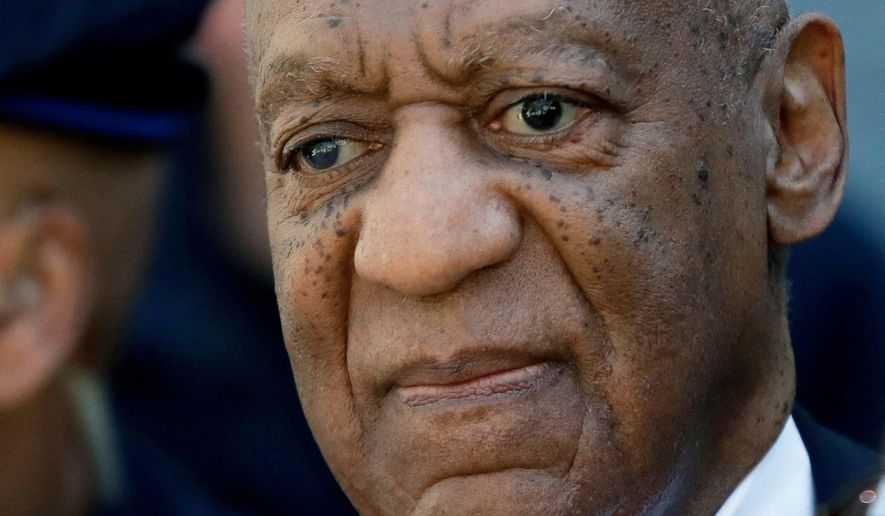The Pennsylvania Supreme Court overturned Bill Cosby’s sexual assault conviction Wednesday, ruling that an agreement with a previous prosecutor prevented him from being charged in the case.
The former comedian and entertainer, 83, was almost immediately released from prison after serving more than two years of a three- to 10-year sentence. He had vowed to serve all 10 years rather than acknowledge any remorse over the 2004 encounter with accuser Andrea Constand.
Mr. Cosby was convicted of drugging and molesting the Temple University employee at his suburban Philadelphia home.
More than 60 women accused Mr. Cosby of sexual misconduct or rape, but none of those other claims resulted in criminal charges. His case became an early flashpoint in the “#MeToo” movement.
The state Supreme Court said a 2005 decision by Bruce Castor, the district attorney for Montgomery County, Pennsylvania, at the time, not to charge Mr. Cosby led him to testify in civil proceedings without the benefit of Fifth Amendment protections against self-incrimination.
Mr. Cosby made self-incriminating statements during those sessions. Separate prosecutors wielded those admissions against him in a later criminal case, leading to his conviction.
“When an unconditional charging decision is made publicly and with the intent to induce action and reliance by the defendant, and when the defendant does so to his detriment (and in some instances upon the advice of counsel), denying the defendant the benefit of that decision is an affront to fundamental fairness, particularly when it results in a criminal prosecution that was foregone for more than a decade,” the court said in its ruling.
The majority said, “For these reasons, Cosby’s convictions and judgment of sentence are vacated, and he is discharged.”
Mr. Cosby was quickly set free from the state prison in suburban Montgomery County and driven home. He flashed the V for victory sign to a helicopter as he walked into his house and later smiled and nodded at a news conference outside his house. He did not comment.
“We are thrilled to have Mr. Cosby home,” his attorney, Jennifer Bonjean, said at the press conference. “He served three years of an unjust sentence, and he did it with dignity and principle.”
In a statement, Ms. Constand and her attorneys called the ruling disappointing. Like many other advocates, they expressed fear that the court’s decision could discourage sexual assault victims from coming forward. “We urge all victims to have their voices heard,” they said.
In a statement, county District Attorney Kevin Steele said Mr. Cosby went free “on a procedural issue that is irrelevant to the facts of the crime.” He commended Ms. Constand for coming forward and added: “My hope is that this decision will not dampen the reporting of sexual assaults by victims.”
Mr. Cosby was charged in late 2015, when Mr. Steele, armed with newly unsealed evidence — Mr. Cosby’s damaging deposition from Ms. Constand’s lawsuit — arrested him days before the 12-year statute of limitations expired.
Mr. Cosby was the first celebrity tried and convicted in the #MeToo era, so the reversal could make prosecutors wary of calling other accusers in similar cases. The law on prior bad act testimony varies by state, though, and the ruling holds sway only in Pennsylvania.
The justices said that overturning the conviction and barring any further prosecution “is the only remedy that comports with society’s reasonable expectations of its elected prosecutors and our criminal justice system.”
The justices voiced concern not just about sexual assault cases, but also what they said is the judiciary’s increasing tendency to allow testimony that crosses the line into character attacks. The law allows the testimony only in limited cases, including to show a crime pattern so specific that it serves to identify the perpetrator.
In New York, the judge presiding over last year’s trial of movie mogul Harvey Weinstein, whose case ignited the #MeToo movement in 2017, let four other accusers testify. Weinstein was convicted and sentenced to 23 years in prison. He is now facing separate charges in California.
In Mr. Cosby’s case, one of his appellate lawyers said prosecutors put on vague evidence about the uncharged conduct, including his own recollections in his deposition about giving women alcohol or quaaludes before sexual encounters.
“The presumption of innocence just didn’t exist for him,” Ms. Bonjean argued to the court in December.
In May, Mr. Cosby was denied parole after refusing to participate in sex offender programs during his nearly three years in state prison. He has long said he would resist the treatment programs and refuse to acknowledge wrongdoing even if it means serving the full 10-year sentence.
This is the first year he was eligible for parole under the three- to 10-year sentence handed down after his 2018 conviction.
Prosecutors said Mr. Cosby repeatedly used his fame and “family man” persona to manipulate young women, holding himself out as a mentor before betraying them.
Mr. Cosby, a groundbreaking Black actor who grew up in public housing in Philadelphia, made a fortune estimated at $400 million during his 50 years in the entertainment industry. His trademark clean comedy and homespun wisdom fueled popular TV shows, books and stand-up acts.
• This article is based on wire service reports.
• Dave Boyer can be reached at dboyer@washingtontimes.com.
• Tom Howell Jr. can be reached at thowell@washingtontimes.com.




Please read our comment policy before commenting.